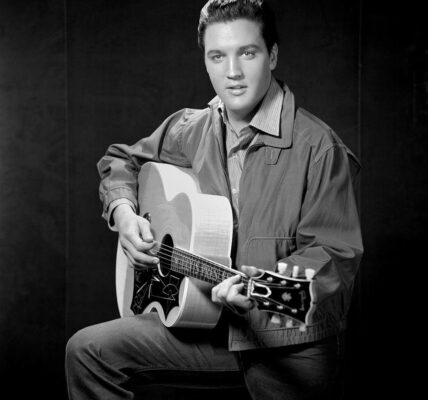“Way Down,” Released in 1977, Captures the Energetic Spirit of Elvis Presley in One of His Final Recordings.0h
“Way Down” by Elvis Presley: A Rocking Farewell to the King
“Way Down,” released in 1977, stands as one of Elvis Presley’s final recordings, and it captures the energy and spirit that defined his career. Written by Layng Martine Jr., the song was featured on Elvis’s last studio album, Moody Blue, and became one of his most iconic late-career hits. Released just weeks before his untimely death, “Way Down” serves as a powerful reminder of the King of Rock ‘n’ Roll’s enduring talent and influence, even in his final days.

Musically, “Way Down” is an upbeat rock ‘n’ roll track that reflects Elvis’s signature style—mixing elements of blues, country, and rock. The song is driven by a strong bass line and rhythm guitar, with Elvis’s deep, resonant voice taking center stage. His vocal performance is electrifying, showcasing the energy and vitality he brought to his recordings, despite the health struggles he faced in the later years of his life.

One of the most memorable aspects of “Way Down” is its infectious chorus, where Elvis sings about feeling love and excitement “way down” deep inside. The catchy, high-energy hook resonates with listeners and shows that even toward the end of his career, Elvis could still deliver the kind of rock ‘n’ roll anthem that made him famous. The song also features J.D. Sumner’s deep bass voice, which added a unique dynamic to the track, complementing Elvis’s own powerful vocals.

Lyrically, “Way Down” is relatively straightforward, focusing on themes of love and passion. It captures the thrill of being completely overwhelmed by someone, with a sense of urgency and intensity that makes the song engaging and memorable. Despite the upbeat tone, there’s an underlying poignancy in knowing this would be one of Elvis’s last releases, making it resonate even more with fans.

Upon its release, “Way Down” quickly gained popularity, especially after Elvis’s death, when it soared to the top of the charts in both the U.K. and the U.S. The song became a posthumous hit, cementing his legacy as a rock ‘n’ roll icon.
In conclusion, “Way Down” is a fitting final chapter in Elvis Presley’s career, blending his signature rock ‘n’ roll sound with emotional depth. It remains a beloved part of his musical legacy, a reminder of his enduring talent and influence on the world of music.
Elvis Aaron Presley, often referred to as the “King of Rock and Roll,” was born on January 8, 1935, in Tupelo, Mississippi, USA. He rose to prominence in the mid-1950s, becoming one of the most iconic and influential figures in the history of popular music. Presley’s musical journey began at an early age when he started singing in church and listening to various genres of music, including gospel, blues, and country. In 1954, he signed a recording contract with Sun Records, where he began his career blending elements of rockabilly, rhythm and blues, and country music. His breakthrough came with the release of his first single, “That’s All Right,” followed by a string of hits such as “Heartbreak Hotel,” “Hound Dog,” and “Jailhouse Rock.” With his charismatic stage presence, distinctive voice, and provocative dance moves, Presley captured the hearts of audiences worldwide, revolutionizing the music industry and popular culture. Presley’s impact extended beyond music; he also found success as an actor, starring in a series of films throughout the 1960s. Despite his commercial success, he faced criticism from some quarters for his crossover into mainstream entertainment and the perceived dilution of his musical authenticity. Throughout his career, Presley struggled with the pressures of fame, leading to personal challenges, including substance abuse and health issues. Despite these obstacles, he remained a beloved figure, revered for his contributions to music and his enduring legacy. Tragically, Elvis Presley passed away on August 16, 1977, at the age of 42, leaving behind a legacy that continues to resonate with generations of fans. He was posthumously inducted into the Rock and Roll Hall of Fame, and his music remains a timeless testament to his enduring talent and cultural impact.


